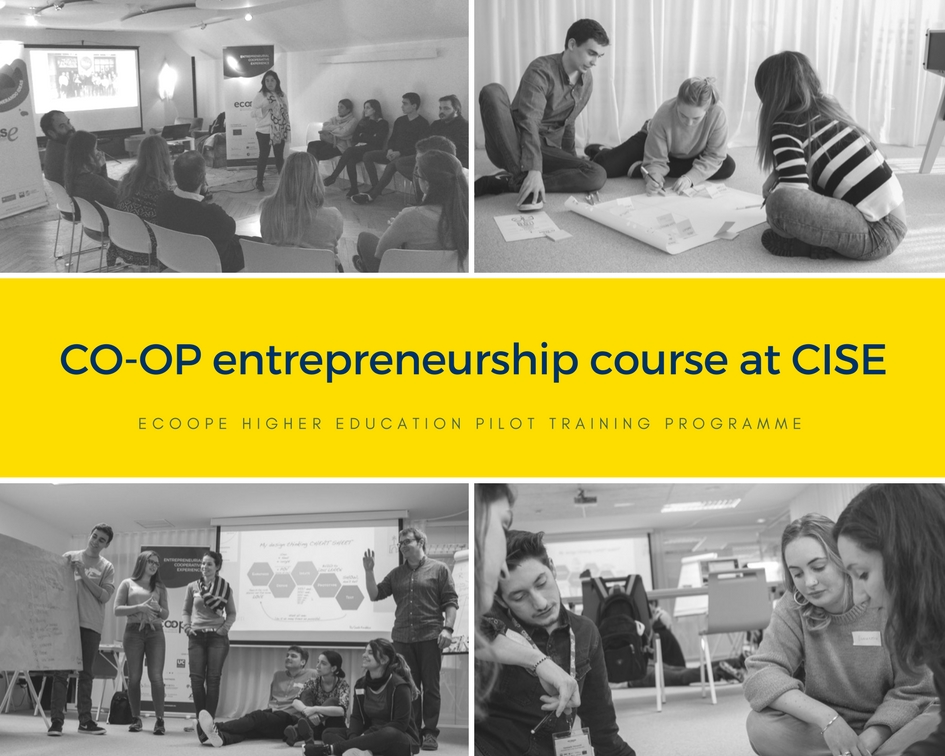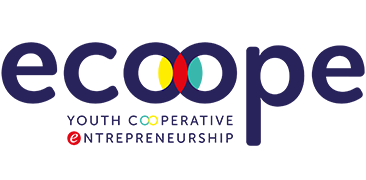
09 Mar Let’s hit it off! Co-operative training at CISE
If you still don’t know what ECOOPE is, you are going to learn a bit more about this EU co-funded project in the following posts.
After our week at Valnalón teaching the co-operative values to secondary students from Portugal and Spain, the ECOOPE Higher Education pilot for European undergraduates and recent graduates has been finally launched! Our participants spent a week at CISE (Santander International Entrepreneurship Centre), where not only did they get to know one another, but also obtained a good understanding of what the co-operative business model is like, combining theory and different activities in an innovative way.
«Santander: The surprise. I really enjoyed meeting the others participants, the CISE team, the university and the city (…). I learned new techniques, new concepts about business strategies and how to connect this knowledge with my cooperative in our future projects». – Liliana da Silva
First of all we have to say that we come from different backgrounds: some of us some cooperative experience but no entrepreneurial notion, others had entrepreneurial or business management background but no social economy idea. The ECOOPE experience intends to combine these two together.
The first day we had the introduction of the project and we got to know one another. They brought us to an exquisite restaurant: Deluz where we had a wine-tasting activity in order to interact. Breaking the ice was essential since we would be spending 5 weeks living with our peers, travelling and working as a team. We had to identify the different origins of the wines following the sommelier’s instructions and locate them on the map of Spain. For the participants going to the winery cooperative (Adega Cooperativa de Mesao Frio in Portugal), we are positive this exercise especially helped them!
A local cooperative, Siete Valles de Montaña, also made a presentation on how they work and what added value they provide the community with.
One interesting thing was that the groups had already been made and we knew who with and where we were travelling to solve the co-operative challenge, but the co-operative company remained a mystery to us, so we were anxious to know what the challenge would be about.
It wasn’t until the second day that we learned which cooperative had been assigned to us. We were really impressed to find out about the brilliant careers the participating co-operatives had and their challenges:
- El Salvador in Torrelavega (Cantabria, Spain) – cooperative school
- Adega Cooperativa de Mesao Frio (Portugal) – winery
- Fundación Espriu (Grupo HLA) – healthcare
- SUMA Wholefoods (West Yorkshire, England) – organic and fairtrade
Our expert was Kate Whittle at Cooperantics, who has a proven-track record in the cooperative wold, and with different group and energiser exercises explained how cooperatives operate, their values, the evolution of the cooperative sector nowadays and what the future of coops is, especially about multistakeholders.
On day 3 we had an introduction to design thinking and prototyping. It was a very dynamic session with David Harrison, we were all around the place, using colours, and believe it or not, we were «playing» with building blocks through (c) Lego Serious Play, a great mind-opening tool to help you transform your ideas into definite actions: it’s more about reversing the process and start creating and then reasoning your train of thought.
Day 4 covered Osterwalder’s Business model canvas, a value-creating tool that would help us understand the problem, identify the facts and re-define the challenge -if needed- towards goal clarification. The expert this time was Aday Guerra, who introduced Lean Start-up, business design and the Value Proposition Canvas, Customer development and hypothesis, problem validation through interviews and the minimum viable product concept.
On our final training day we had to work on our working plan for the following 4 weeks at cooperatives, and Ronny Conde helped us: basically to have a critical thinking attitude, to get perspective from every stakeholder, to be empathetic but open minded, and to know when to pivot and re-direct goals. Kind of disruptive from everything we had seen before, but a useful insight to take into acount.
The goals of the course were met: the cooperative entrepreneurship framework as key to start-up, develop and grow a cooperative; to understand the co-operative driving values and the main differences from the more common capital-based companies; we embraced the need for incorporating the social, environmental, … dimension into viable business projects and we acquired excellent tools for working at our destinations and helping the cooperatives solve their challenges.
Off we go!



No Comments